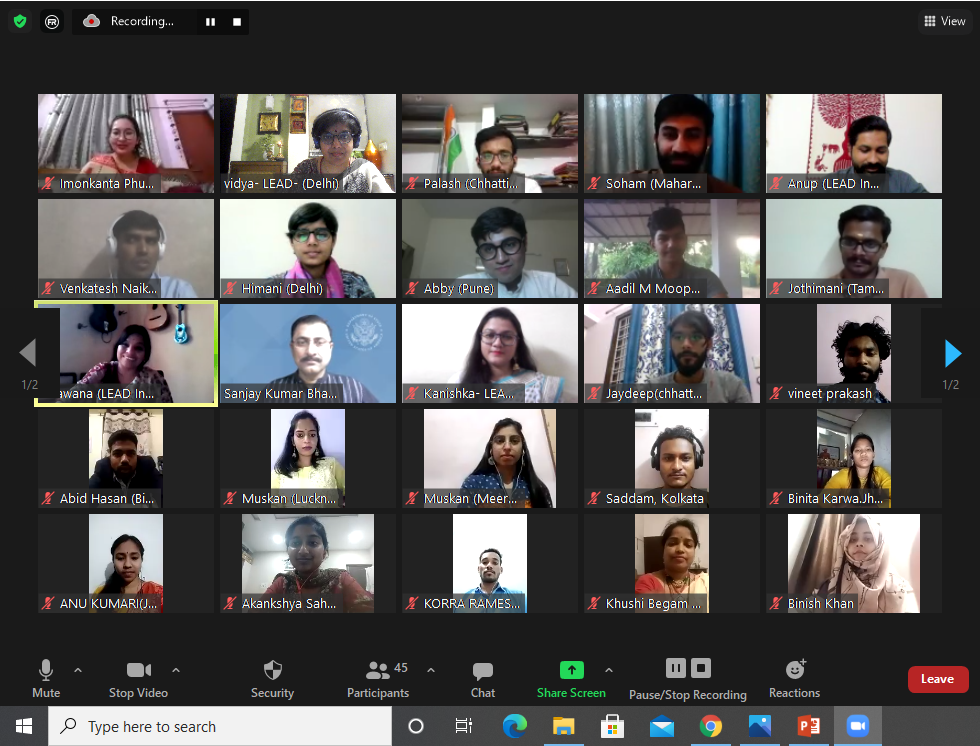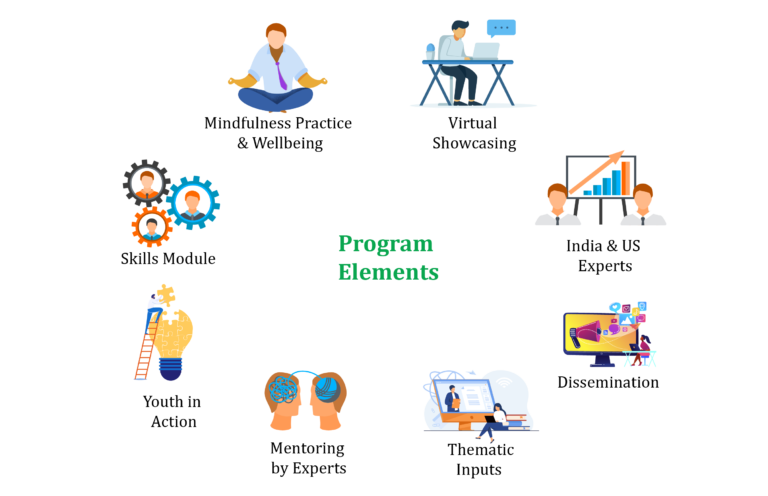Youth Leadership and Engagement in Social Action

The purpose of the program was enhancing the capacity of local youth through training, community engagement and mentorship, to develop their leadership capability, problem-solving skills, and preparing them to be fully engaged citizens and leaders, during the Pandemic and beyond.
Specific competencies were honed to prepare youth for thinking and action beyond self, for the greater community. For this, sessions on Systems Thinking, Design Thinking, Adaptive Leadership, Democratic Decision Making, Way to take people along, Networking and building partnerships, Stakeholder engagement, Project planning, budgeting, execution, Communication- Interpersonal, Presentation skills were offered to the participants. Methods included sharing pre-reads, videos, worksheets, activities and home tasks, discussions, peer to peer learning, presentations, story- telling and simulation. A system of self- governance was adopted to engage participants in leadership role to practice ‘leadership in action’, a real time leadership practice in a safe place, during the input phase of the project. A detailed and engaging project formulation process was adopted, with ideation within the group, validation in the field and co-creating with the community, a project to address their real life situation. Projects were presented, feedback were incorporated, finalized and approved by the panel of experts from LEAD and U.S. Embassy. At each stage, groups were mentored by LEAD team. 14 group projects were implemented. During the social action phase, ie. Project implementation by the youth, an online monitoring system was developed and executed in collaboration with the participants. Post the project completion, projects were showcased in the presence of LEAD team, invitees and U.S. Embassy Officials.
Elements of learning journey
- Self-awareness Practices
- Inputs on Leadership, themes and competencies related to project designing and implementation
- Inputs on Skills- Systems Thinking, Design Thinking, Adaptive Leadership, Democratic Decision Making, Stakeholder engagement, Networking and building partnerships, Project planning, budgeting, execution, Communication- Interpersonal, Presentation skills
- Field research, project conceptualization, planning and implementation
- Peer-to-peer learning
- Mentoring Support
- Networking Platform

Shifts at the individual level
- Knowing one’s own mental model
- Greater awareness about one’s feelings
- Offering oneself to listening to others
- Appreciating multiple perspectives
- Suspending judgements
- Letting go of positions taken
- Accepting the possibility of ‘I do not know’
- Accepting diversity and inclusion
- Accepting diverse gender orientation and disability
- Believing and practicing collaboration
- Practicing Empathy and sensitivity
- Practising forgiveness
- Accepting failure and opening oneself to learning from that
- Expressing team spirit
- Finding one’s purpose
- Working towards building trust
- Operating from a space of compassion
- Greater confidence in public speaking
Shifts at the Collective level (Cohort)
- Greater ownership of the collective space
- Camaraderie increased among the participants during group work on thematic
- Assignment and presentations
- Interaction and bonding between the group increased, paving the way to know each other better and creation of a ‘purpose driven community’
- Volunteering and supporting each other’s projects
- Shared responsibility and efforts was experienced, that go behind the scenes of the real-life scenarios
- Holding the group through purpose driven micro-collective drives
- Readiness to explore more purpose driven action in the future
- The value of self-governance, and also how everyone together can make the most of the learning space
- Acknowledging the group effort and not an individual
- Greater awareness, acceptance and empathy for gender orientations
- Greater awareness of making spaces inclusive
- More powerful expression as the project progressed, where participants reflected on their feelings and opened up to sharing with authenticity.
- Move from ‘What I want to offer to the community’ to “Responding to the needs of the community’
- Volunteering and supporting each other for reasons beyond the YLESA project
14 concrete Action Projects
Revitalized minds
Empowering and supporting the mental health of autistic children, youth and neurotypical children and youth, in Pune, Mangalore and Chennai
ILearn4me
Students from Katrain, Bihar were trained on English language and communication to develop confidence in communicating to the external world
Women For Women
Self-sustainable virtual community of 100 working women to support and hold each other
Adi Shakti
Equipped women, 15-50 years, with awareness on legal, medical procedures related to atrocities against women and self-defense skills. Implemented virtually, and in Hyderabad
Dayitva
The project focused on generating awareness about career opportunities in India, and training a group of youth in interview skills. The project was implemented in Ahmedabad and Kochi.
Maitri
Women from a community in Pune were trained to make cloth pad and were connected to non- profit organization for continued future supply.
Saarathi
A Comic book initiative to raise awareness and knowledge regarding social evils and socio-emotional losses faced by tribal students during COVID pandemic. It was launched in a tribal school in Sonitpur, Assam, reaching out to 500 students.
Unscramble
Building resilience and inculcating effective and healthy coping strategies amongst children in distress, to sustain their physical and mental health. Implemented in Delhi cluster, school in Mizoram and in collaboration with a non- formal school in Kolkata
Project Dignity
28 women labour were interviewed, in Chattisgarh, Hisar and Jharkhand and they were informed about their rights and benefits they are entitled to. This information is available to inform policy makers who can plan for better health and hygiene services for the labor.
Prayaas
45 students of Pune who rejoined school after COVID Pandemic were engaged in learning science through experiments and games. 5 local youth participated to support the team.
The Mann talks
20 children between 13-17 years from Jammu district underwent the workshops on life skills for better mental health. Virtual support groups have been formed to sustain the initiative.
Action against Plastic Pollution
200 plus volunteers were enrolled to remove tons of plastic waste from the Mithi river banks, Mumbai. Maharashtra. Collaborations were forged with NGOs to mobilize more youth
21 Days Challenge
Youth from across India undergoing the this leadership journey came together to form new habits and drop degenerative ones. Each participant motivated and anchored each other through inspiring posting of their own daily healthy practices.
T Super 44 COVID response
20 A youth led collective COVID response initiative spread across urban and rural India The group of 44 reached out to 700 people , they were supported logistically, and emotionally when the pandemic started peaking in 2021 to sustain the initiative.
